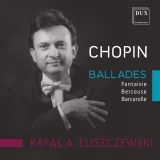 Frédéric Chopin: Balladen Nr. 1-4 + Fantaisie op. 49 + Berceuse op. 57 + Barcarolle op. 60; Rafal A. Luszczewski, Klavier; 1 CD Dux 1627; Aufnahmen 2016/2017, Veröffentlichung 12/2019 -01/2020 (61'26) - Rezension von Remy Franck
Frédéric Chopin: Balladen Nr. 1-4 + Fantaisie op. 49 + Berceuse op. 57 + Barcarolle op. 60; Rafal A. Luszczewski, Klavier; 1 CD Dux 1627; Aufnahmen 2016/2017, Veröffentlichung 12/2019 -01/2020 (61'26) - Rezension von Remy Franck
Einen richtig guten Klaviersound, sehr natürlich, mit Relief und gut dosierter Räumlichkeit haben die Tontechniker für diese Chopin-Platte des 1979 geborenen Rafal Aleksander Luszczewski hinbekommen. Und den nutzt der Pole für ein richtig gutes und packendes Programm.
Schon sehr lange, immerhin seit 1995, habe ich keine so gute Erste Chopin-Ballade mehr gehört. Das ist reiner Gesang, emphatisch, dramatisch, drängend und geradezu explosiv im Ausdruck, mit einer sehr persönlichen Spontaneität und einer phänomenalen Energie. Klarheit der Phrasierung, perfekte Ausgewogenheit der Eleganz, virile Klänge: Luszczewski ist einer jener Pianisten, bei denen man immer den Eindruck hat, etwas Unmittelbares zu erleben, so auch in den großen Kontrasten der Zweiten Ballade. Die der lyrischen Einleitung folgende Eruption ist grandios und ebbt dann ebenso bedeutsam ab. Diese Zerrissenheit wird packend fortgesetzt und prägt auch die Dritte Ballade, die wie alle anderen auf einem sehr transparenten und immer spannungsvollen Spiel beruht, das die vielen Seiten von Chopins Seelenleben hervorkehrt. Wie weit sind wir hier doch von der klinisch reinen Sicht Pollinis auf diese Werke weg.
In der weitaus reflektiveren 4. Ballade gelingt es Luszczewski, die Flamme des Diskurses nie ausgehen zu lassen. Und so spricht aus den vier Balladen und auch aus der Fantasie op. 49 und der perfekt strukturierten Barcarolle vieles, was für Chopin steht, der Charme und die Eleganz des mondänen Salonlöwen, das blendend Virtuose seiner Musik, das Süße und Zarte (das aber nicht süßlich werden darf), die Wehmut, die laut und tobend kundgetane innere Revolte, die düstere Erschütterung, kurz dieses Slawisch-Romantische, das Chopins Lebensstil war.
For this Chopin recording by Rafal Aleksander Luszczewski the recording technicians achieved a really good piano sound, very natural, with relief and well-dosed three-dimensionality. The Polish pianist uses this good sound for a really good and gripping program.
For a very long time, at least since 1995, I haven’t heard such a good first Chopin Ballad. This is pure singing, emphatic, dramatic, urgent and almost explosive in expression, with a very personal spontaneity and a phenomenal energy. Clarity of phrasing, perfect balance of elegance and virile sounds: Luszczewski is one of those pianists with whom one always has the impression of experiencing something immediate, as it is the case with the great contrasts of the Second Ballad. The eruption following the lyrical introduction is grandiose and then ebbs away just as significantly. The movement continues in a most gripping way, as does the Third Ballad, which, like all the others, is based on a very transparent and always exciting playing that brings out the many sides of Chopin’s soul. How far are we here away from Pollini’s clinically pure view of these works.
In the far more reflective Fourth Ballad, Luszczewski succeeds in continuously maintaining the tension. And so almost everything that stands for Chopin is present in the four ballads and also in the Fantasy op. 49 and the perfectly structured Barcarolle, i.e. the charm and elegance, the dazzling virtuosity, the tenderness, the melancholy, the loud and raging inner revolt, the gloomy shock, in short all this Slavic-Romantic character of Chopin’s lifestyle.
























